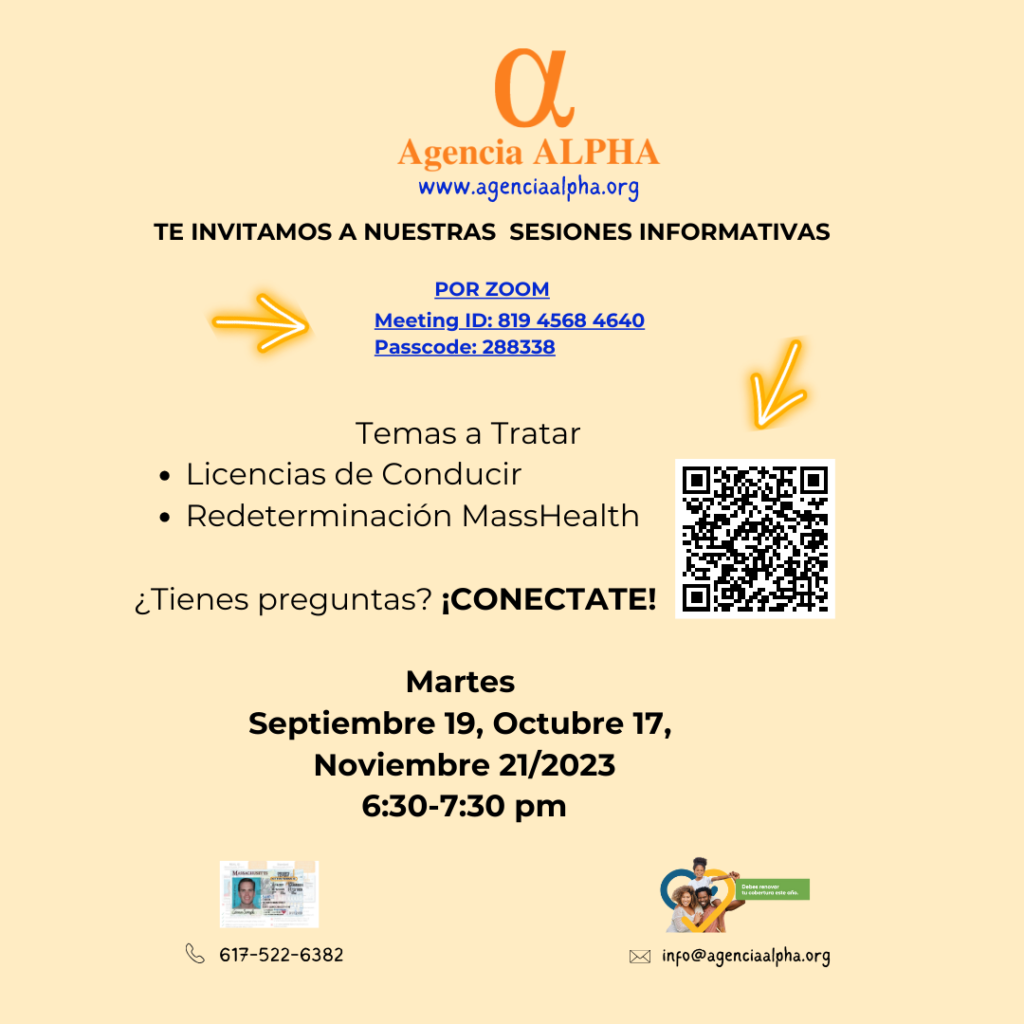Agencia ALPHA participated at the hearing on favor of the Cover All Kids Act that took place at the State House on Tuesday July 25th. Melissa, a youth coordinator of ALPHA’s Youth Leadership Program shared a powerful testimony which combined with the presence of our youth group, touched the heart of the Chair Friedman, Chair Lawn and the members of the committee. We are so proud of our youth group and of Melissa!!!
Uncategorized
Activates National Guard to Provide Services at Emergency Shelter Sites
Governor Healey Activates National Guard to Provide Services at Emergency Shelter Sites
Guard members to coordinate food, transportation, medical care, and other basic needs
Administration also launches Regional Rapid Response Teams to oversee shelter sites
BOSTON – Governor Maura T. Healey today issued an order activating up to 250 National Guard members to provide basic services at emergency shelter hotels that do not currently have a contracted service provider. The administration is also launching Regional Rapid Response Teams to assist with overseeing shelter sites and serving as a direct contact to the administration to address any concerns.
Earlier this month, the Governor issued a state of emergency over rapidly rising numbers of migrant families arriving in Massachusetts, requiring the state’s emergency shelter system to expand in an unsustainable manner. There are currently more than 6,000 families, including children and pregnant women, in emergency shelters across the state.
“Massachusetts is in a state of emergency, and we need all hands-on deck to meet this moment and ensure families have access to safe shelter and basic services,” said Governor Healey. “We’re grateful to the brave men and women of the National Guard for stepping up to help us ensure that every family in emergency shelter has their needs met, including access to food, transportation, medical care, and education. While we work to implement a more permanent staffing solution, the National Guard will provide an efficient and effective means of delivering these services and keeping everybody safe.”
“This National Guard activation is a necessary step to ensure that families in emergency shelter have access to the services they need to stay safe and healthy,” said Lieutenant Governor Driscoll. “This is an emergency measure that will help us meet immediate needs while we continue to advocate for assistance from the federal government in the form of streamlined work authorizations and funding.”
“We are committed to being Always Ready and Always There for the residents of Massachusetts,” said Maj. Gen. Gary W. Keefe, The Adjutant General, Massachusetts National Guard. “Our role in the response to the ongoing housing crisis will expand to leverage our multitude of robust and adaptable capabilities in emergency and domestic operations to help those in need.”
As the administration has continued to add new shelter sites to meet demand, service providers have been stretched thin. This action by Governor Healey will help ensure that families placed in hotels have access to basic services. Beginning next week, each National Guard member will be assigned to a specific hotel shelter sites, where they will facilitate the onsite coordination of services such as food, basic needs, transportation, and medical care delivered by the site, external vendors, community organizations, and state and local government. This will include assisting local school districts with enrolling children in a school that meets their educational needs.
The Guard will also be responsible for escalating issues to newly created Regional Rapid Response Teams. The teams will be staffed by state employees and tasked with overseeing sites in a given geographic region to better coordinate services and serve as central points of contact in the administration for any issues or concerns. The Regional Response Teams will prepare sites for opening, communicate site-specifics to inform placements, arrange connection to public benefits, and support municipal and legislative partners.
In issuing her emergency declaration earlier this month, Governor Healey appealed to the federal government for assistance with streamlining work authorizations and funding. Last week, the Governor and her team met with Department of Homeland Security Secretary Alejandro Mayorkas to discuss the support that Massachusetts needs to address the rapidly rising number of migrant families arriving in Massachusetts, including work authorizations. The administration and the City of Boston also recently received a $1.9 million grant from FEMA to support shelter services.
Free Community College for Massachusetts Residents
Governor Healey Launches Free Community College for Massachusetts Residents 25+, Delivers $100,000 to Each Community College for Implementation
MassReconnect Will Help Meet Workforce Needs, Address Economic Skills Gap, and Offer Transformative Chance at Degree for Massachusetts Adults
WELLESLEY—Governor Maura T. Healey today launched MassReconnect, her administration’s new program establishing free community college for Massachusetts residents aged 25 and older, and awarded $100,000 to each of Massachusetts’ 15 community colleges to support the quick implementation of the program this fall. Governor Healey was joined by Lt. Governor Kim Driscoll, Senate President Karen Spilka, Secretary of Education Patrick Tutwiler, Commissioner of Higher Education Noe Ortega, and the community college presidents today at MassBay Community College’s Wellesley Campus. During the event, the Healey-Driscoll Administration highlighted the first MassReconnect students at MassBay, celebrating the impact the program is expected to have for students across the state.
“MassReconnect will be transformative for thousands of students, for our amazing community colleges, and for our economy,” said Governor Healey. “It will bolster the role of community colleges as economic drivers in our state and help us better meet the needs of businesses to find qualified, well-trained workers. We can also make progress in breaking cycles of intergenerational poverty by helping residents complete their higher education credentials so they can attain good jobs and build a career path. Our administration is grateful for the partnership of the Legislature to move forward on this critical program that will make our state more affordable, competitive and equitable.”
“Our administration and our community college partners are ready to hit the ground running with MassReconnect this fall semester. We encourage any eligible students who might have been holding off on taking that final step to enroll to do so now to begin this next stage of their education and career,” said Lieutenant Governor Driscoll. “We are also proud to be setting our community colleges up for success by providing them each with $100,000 for implementation of this lifechanging program.”
“In Massachusetts, we know that getting an education is a key to the middle class, supporting a family, building a life, and pursuing a brighter future. In this year’s state budget, we thrust open the doors to those opportunities and countless others, by making community college free for people 25 and over, making nursing programs at community colleges free for all individuals, and setting our state on a path to universal free community college in 2024,” said Senate President Karen E. Spilka (D-Ashland). “These proposals are a major step towards the Senate’s Student Opportunity Plan and are crucial to ensuring residents have the tools to build the futures they dream of—right here in Massachusetts. I am deeply grateful to Governor Healey, Lieutenant Governor Driscoll, Secretary Tutwiler, Commissioner Ortega, Senate Ways and Means Chair Michael Rodrigues, Senate Higher Education Committee Co-chair Jo Comerford, and Speaker Mariano, for making education a priority in Massachusetts.”
“MassReconnect will create life-changing educational and career opportunities through free community college for qualifying residents at institutions such as Quincy College and at other community colleges across the Commonwealth, including for many residents from historically underserved communities. This program will also help to address key labor shortages, while ensuring that Massachusetts possesses a highly trained workforce that is prepared for the industries of the future,” said House Speaker Ronald J. Mariano (D-Quincy). “I want to thank the Healey Administration, Chairman Michlewitz and my colleagues in the House, as well as Senate President Spilka and our partners in the Senate, for working to include this transformative program in the Commonwealth’s FY24 budget.”
Governor Healey invested $20 million in MassReconnect for the first year of implementation in her first budget that she signed earlier this month. This funding covers the full cost of tuition and fees and includes an allowance for books and supplies at each of Massachusetts’ 15 community colleges. Additionally, each community college will also receive $100,000 from this funding to support student and community program awareness, staffing, and program administration. Quincy College also received $1.5 million in the FY24 budget to operate a similar program.
There is still time to enroll in MassReconnect for this fall. The only steps necessary to sign up are to enroll in at least six credits per semester in an approved program of study leading to an associate degree or certificate at one of the Commonwealth’s 15 community colleges and complete the 2023-2024 FAFSA (Free Application for Student Aid). There is no deadline to sign up. The majority of community college programs begin the first week of September, but there are scattered start dates throughout the semester, so students can enroll at any time.
In order to qualify for MassReconnect, students must be 25 or older on the first day of their classes and be a permanent Massachusetts resident for at least one year at the start of the enrolled term. The program is limited to residents who have not previously earned a college degree (associates or bachelor’s) who enroll in at least six credits per semester in an approved program of study leading to an associate degree or certificate at a community college.
“There’s no doubt that with MassReconnect we will be able to change the lives of each of the students who take advantage of this historic opportunity to achieve their degree,” said Secretary of Education Tutwiler. “But beyond our students, this program will also strengthen the Commonwealth’s economy and our public higher education system, By investing in our community college students, the Healey-Driscoll Administration is investing in the future of the Commonwealth.”
MassReconnect will likely support up to 6,500-8,000 community college students in the first year, which could grow to closer to 10,000 students by FY25, depending on how many students take advantage of the new opportunity. They could include current students, new students, or returning students who did not complete their degree. There are approximately 700,000 Massachusetts residents who have some college credit but no degree. MassReconnect will help bring back these students to finish their degrees, with the additional funding and support they may have been lacking the first time.
“With the Healey-Driscoll Administration’s record-breaking investment in higher education, including the highest levels of support for financial aid and scholarships the Commonwealth has ever seen, we will be able to expand access to higher learning more than ever before. MassReconnect is the centerpiece of that effort,” said Commissioner of the Department of Higher Education Ortega. “For all the Massachusetts adults out there who had to put their education on hold or didn’t have the opportunity to pursue it in the first place, now is your chance to pursue a degree or certificate to advance your career and transform your life and that of your family.”
The Commonwealth’s 15 community colleges are a ticket to economic mobility for many Massachusetts residents, and thus are key drivers of our business and our economic success. Nationally, employees who have earned their associate degree are paid 18 percent more than workers with only a high school diploma, according to the Bureau of Labor Statistics. And these well-paying jobs are just waiting to be filled—in July 2023 there were more than 26,000 unique job postings in the Commonwealth that specifically required an associate degree. MassReconnect will harness the power of our community colleges by allowing workers to earn the training and education necessary for their career growth and reinforcing our pipeline of skilled industry professionals entering the workforce.
“For adults coming to one of the fifteen community colleges across the Commonwealth, MassReconnect removes one of the biggest barriers to attendance: cost,” said Jim Vander Hooven, president of Mount Wachusett Community College and chair of the Community College Council of Presidents. “By making community college completely free for any adult over 25 in Massachusetts without a degree, the Healey-Driscoll Administration is making an historic investment in our state’s workforce and providing hundreds of thousands of adults with a clear pathway to a career.”
Recursos para las Licencias de Conducir
DHS Rescinds Prior Administration’s Termination of Temporary Protected Status Designations for El Salvador, Honduras, Nepal, and Nicaragua
Release Date
06/13/2023
Decision Extends TPS Designations for 18 Months for Current Beneficiaries
WASHINGTON – Today, the Department of Homeland Security (DHS) announced the rescission of the prior Administration’s terminations of the Temporary Protected Status (TPS) designations for El Salvador, Honduras, Nepal, and Nicaragua and the extension of TPS for these for countries for 18 months. Today’s actions are relevant to the litigation challenging the now-rescinded terminations. As always, DHS closely monitors conditions around the world to assess whether new TPS designations are warranted.
“Through the extension of Temporary Protected Status, we are able to offer continued safety and protection to current beneficiaries who are nationals of El Salvador, Honduras, Nepal, and Nicaragua who are already present in the United States and cannot return because of the impacts of environmental disasters,” said Secretary of Homeland Security Alejandro N. Mayorkas. “We will continue to offer support to them through this temporary form of humanitarian relief.”
Soon-to-be-published Federal Register notices will explain the eligibility criteria, timelines, and procedures necessary for current beneficiaries to re-register for TPS and renew their Employment Authorization Documents (EADs).
Once the notices are published, existing TPS beneficiaries under the four designations will be able to re-register to continue their TPS throughout the 18-month extension. Individuals who arrived in the United States after the continuous residence dates for these designations are not eligible for TPS and, if they enter without legal authorization and do not have a lawful basis to remain in the United States, will be subject to removal. The respective continuous residence dates are Feb. 13, 2001, for El Salvador; Dec. 30, 1998, for Honduras and Nicaragua; and June 24, 2015, for Nepal.
To ensure continued compliance with court orders in the litigation challenging the now-rescinded termination decisions, DHS previously extended the validity of TPS-related documentation for current beneficiaries who are nationals of El Salvador, Honduras, Nepal, and Nicaragua through June 30, 2024. Details about each country’s extension and the re-registration period are set forth below and will be further explained in forthcoming Federal Register Notices.
El Salvador
DHS is extending the designation of El Salvador for TPS for 18 months, from Sept. 10, 2023, through March 9, 2025. The new extension allows approximately 239,000 current TPS beneficiaries to re-register to retain TPS through March 9, 2025, if they otherwise continue to meet the eligibility requirements for TPS. Existing TPS beneficiaries who wish to extend their status through March 9, 2025, must re-register during the 60-day re-registration period from July 12, 2023, through Sept. 10, 2023.
Honduras
DHS is extending the designation of Honduras for TPS for 18 months, from Jan. 6, 2024, through July 5, 2025. The new extension allows approximately 76,000 existing TPS beneficiaries to re-register to retain TPS through July 5, 2025, if they otherwise continue to meet the eligibility requirements for TPS. Existing TPS beneficiaries who wish to extend their status through July 5, 2025, must re-register during the 60-day re-registration period from Nov. 6, 2023, through Jan. 5, 2024.
Nepal
DHS is extending the designation of Nepal for TPS for 18 months, from Dec. 25, 2023, through June 24, 2025. The new extension allows approximately 14,500 existing TPS beneficiaries to re-register to retain TPS through June 24, 2025, if they otherwise continue to meet the eligibility requirements for TPS. Existing TPS beneficiaries who wish to extend their status through June 24, 2025, must re-register during the 60-day re-registration period from Oct. 24, 2023, through Dec. 23, 2023.
Nicaragua
DHS is extending the designation of Nicaragua for TPS for 18 months, from Jan. 6, 2024, through July 5, 2025. The new extension allows approximately 4,000 current TPS beneficiaries to re-register to retain TPS through July 5, 2025, if they otherwise continue to meet the eligibility requirements for TPS. Existing TPS beneficiaries who wish to extend their status through July 5, 2025, must re-register during the 60-day re-registration period from Nov. 6, 2023, through Jan. 5, 2024.
The decisions to rescind the termination of the designations of these four countries for TPS are effective on June 9, 2023.
For additional information, please see the specific TPS country pages on the USCIS website, and the USCIS Ramos v. Nielsen webpage.
TPS – re-registration
ALERT: On June 13, 2023, Secretary of Homeland Security Alejandro N. Mayorkas announced his decision to rescind the 2017 and 2018 terminations of the Temporary Protected Status (TPS) designations of El Salvador, Honduras, Nepal and Nicaragua effective June 9, 2023, and extend the TPS designations of:
- El Salvador for 18 months, from Sept. 10, 2023, through March 9, 2025 (60-day re-registration period from July 12, 2023, through Sept. 10, 2023);
- Honduras for 18 months, from Jan. 6, 2024, through July 5, 2025 (60-day re-registration period from Nov. 6, 2023, through Jan. 5, 2024);
- Nepal for 18 months, from Dec. 25, 2023, through June 24, 2025 (60-day re-registration period from Oct. 24, 2023, through Dec. 23, 2023);
- Nicaragua for 18 months, from Jan. 6, 2024, through July 5, 2025 (60-day re-registration period from Nov. 6, 2023, through Jan. 5, 2024).
Existing TPS beneficiaries who wish to extend their status must re-register during the 60-day re-registration period for their country’s designation. Please do not re-register for TPS until the re-registration period for your country begins. USCIS cannot adjudicate your application before the effective date of the extension. For additional information, please see the news release: DHS Rescinds Prior Administration’s Termination of Temporary Protected Status Designations for El Salvador, Honduras,
Nepal, and Nicaragua.
DHS Rescinde la Cancelación hecha por la Administración Anterior de las Designaciones de Estatus de Protección Temporal para El Salvador, Honduras, Nepal y Nicaragua
Fecha de Publicación
06/13/2023
La decisión extiende las designaciones de TPS por 18 meses para los beneficiarios actuales
WASHINGTON – Hoy, el Departamento de Seguridad Nacional (DHS) anunció la rescisión de las cancelaciones hechas por la administración anterior de las designaciones de Estatus de Protección Temporal (TPS) para El Salvador, Honduras, Nepal y Nicaragua, y la extensión del TPS para estos países por 18 meses. Las acciones de hoy son relevantes para el litio que impugna las cancelaciones ahora rescindidas. Como es usual, DHS monitorea de cerca las condiciones en todo el mundo para evaluar si se justifican nuevas designaciones al TPS.
“A través de la extensión del Estatus de Protección Temporal, podemos ofrecer seguridad y protección continuas a los beneficiarios actuales que son nacionales de El Salvador, Honduras, Nepal y Nicaragua que ya están presentes en Estados Unidos y no pueden regresar a sus países debido a los efectos de los desastres ambientales”, dijo el secretario de Seguridad Nacional, Alejandro N. Mayorkas. “Continuaremos ofreciéndoles apoyo a través de esta forma temporal de ayuda humanitaria”.
Las notificaciones del Registro Federal que pronto se publicarán explicarán los criterios de elegibilidad, los plazos y los procedimientos necesarios para que los beneficiarios actuales se reinscriban al TPS y renueven sus Documentos de Autorización de Empleo (EAD).
Una vez que se publiquen las notificaciones, los beneficiarios actuales de TPS bajo las cuatro designaciones podrán reinscribirse para continuar con su TPS durante la extensión de 18 meses. Las personas que llegaron a Estados Unidos después de las fechas de residencia continua para estas designaciones no son elegibles al TPS y, si ingresan sin autorización legal y no tienen una base legal para permanecer en Estados Unidos, estarán sujetas a remoción. Las respectivas fechas de residencia continua son el 13 de febrero de 2001 para El Salvador, 30 de diciembre de 1998 para Honduras y Nicaragua, y el 24 de junio de 2015 para Nepal.
Para garantizar el cumplimiento continuo de las órdenes judiciales en el litigio que impugna las decisiones de cancelación ahora rescindidas, DHS extendió previamente la validez de la documentación relacionada con el TPS de los beneficiarios actuales que son nacionales de El Salvador, Honduras, Nepal y Nicaragua, hasta el 30 de junio de 2024. Los detalles sobre la extensión de cada país y el período de reinscripción se establecen a continuación y se explicarán con más detalle en las notificaciones del Registro Federal que se publicarán próximamente.
El Salvador
DHS ha extendido la designación de El Salvador al TPS por 18 meses, desde el 10 de septiembre de 2023 hasta el 9 de marzo de 2025. La nueva extensión permite que aproximadamente 239,000 beneficiarios actuales de TPS se reinscriban para retener TPS hasta el 9 de marzo de 2025, si continúan cumpliendo con los requisitos de elegibilidad al TPS. Los beneficiarios actuales de TPS que deseen extender su estatus hasta el 9 de marzo de 2025 deben reinscribirse durante el período de reinscripción de 60 días desde el 12 de julio de 2023 hasta el 10 de septiembre de 2023.
Honduras
DHS ha extendido la designación de Honduras al TPS por 18 meses, desde el 6 de enero de 2024 hasta el 5 de julio de 2025. La nueva extensión permite que aproximadamente 76,000 beneficiarios actuales de TPS se reinscriban para retener el TPS hasta el 5 de julio de 2025, si continúan cumpliendo con los requisitos de elegibilidad al TPS. Los beneficiarios actuales de TPS que deseen extender su estatus hasta el 5 de julio de 2025 deben reinscribirse durante el período de reinscripción de 60 días desde el 6 de noviembre de 2023 hasta el 5 de enero de 2024.
Nepal
DHS ha extendido la designación de Nepal al TPS por 18 meses, desde el 25 de diciembre de 2023 hasta el 24 de junio de 2025. La nueva extensión permite que aproximadamente 14,500 beneficiarios actuales de TPS se reinscriban para retener TPS hasta el 24 de junio de 2025, si continúan cumpliendo con los requisitos de elegibilidad al TPS. Los beneficiarios actuales de TPS que deseen extender su estatus hasta el 24 de junio de 2025 deben reinscribirse durante el período de reinscripción de 60 días desde el 24 de octubre de 2023 hasta el 23 de diciembre de 2023.
Nicaragua
DHS ha extendido la designación de Nicaragua al TPS por 18 meses, desde el 6 de enero de 2024 hasta el 5 de julio de 2025. La nueva extensión permite que aproximadamente 4,000 beneficiarios actuales de TPS se reinscriban para retener TPS hasta el 5 de julio de 2025, si continúan cumpliendo con los requisitos de elegibilidad al TPS. Los beneficiarios actuales de TPS que deseen extender su estatus hasta el 5 de julio de 2025 deben reinscribirse durante el período de reinscripción de 60 días, desde el 6 de noviembre de 2023 hasta el 5 de enero de 2024.
Las decisiones de rescindir la cancelación de las designaciones de estos cuatro países al TPS entrarán en vigencia el 9 de junio de 2023.
Para obtener información adicional, por favor, consulte las páginas específicas de los países con TPS en el sitio web de USCIS y la página de USCIS Ramos v. Nielsen.
Sesiones Informativas-Licencias de Conducir

Work and Family Mobility Act (WFMA)
Starting July 1, 2023, eligible residents in Massachusetts can obtain a Standard (Class D or M) driver’s license, regardless of immigration status, under the Work and Family Mobility Act.
The Work and Family Mobility Act removes the requirement that customers provide proof of lawful presence for a Standard Driver’s license.
The RMV is committed to providing quality services to all customers. We are working hard to develop informational resources, translation services, and guidance to help all Massachusetts residents access driver’s licenses.
To obtain a license, the RMV will require all applicants to prove their identity, date of birth, and Massachusetts residency. To see the expanded list of documents the RMV will accept, scroll down. Drivers will also be required to pass a learner’s permit exam, vision screening, and a road test.
Please use the information below to successfully get your license. Read more…
Please use the information below to successfully get your license.
TABLE OF CONTENTS
Licencias de Conducir
MassHealth Redeterminations – Health Care For All














